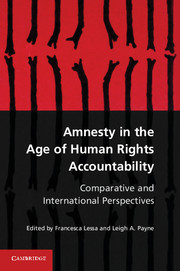Book contents
- Frontmatter
- Contents
- Contributors
- Foreword
- Acknowledgments
- Introduction
- Part I Theoretical Framework
- Part II Comparative Case Studies
- 3 Amnesties’ Challenge to the Global Accountability Norm?
- 4 From Amnesty to Accountability
- 5 Barriers to Justice
- 6 Resistance to Change
- 7 De Facto and De Jure Amnesty Laws
- 8 Creeks of Justice
- 9 Accountability through Conditional Amnesty
- 10 De Facto Amnesty?
- 11 A Limited Amnesty?
- 12 The Spanish Amnesty Law of 1977 in Comparative Perspective
- Conclusion Amnesty in the Age of Accountability
- Bibliography
- Index
- References
Conclusion - Amnesty in the Age of Accountability
Published online by Cambridge University Press: 05 June 2012
- Frontmatter
- Contents
- Contributors
- Foreword
- Acknowledgments
- Introduction
- Part I Theoretical Framework
- Part II Comparative Case Studies
- 3 Amnesties’ Challenge to the Global Accountability Norm?
- 4 From Amnesty to Accountability
- 5 Barriers to Justice
- 6 Resistance to Change
- 7 De Facto and De Jure Amnesty Laws
- 8 Creeks of Justice
- 9 Accountability through Conditional Amnesty
- 10 De Facto Amnesty?
- 11 A Limited Amnesty?
- 12 The Spanish Amnesty Law of 1977 in Comparative Perspective
- Conclusion Amnesty in the Age of Accountability
- Bibliography
- Index
- References
Summary
Is amnesty an appropriate response to past human rights atrocities? This is the question that motivates this volume. That seemingly simple inquiry provokes many more questions. For those who answer “yes,” for example, we would probe “under what conditions?” For those who answer “no,” we might ask, “why have amnesties persisted despite the age of accountability?” The authors in this volume, however, do not give simple “yes” or “no” answers to the underlying question. They instead thoughtfully reflect on the conditions, relationships, patterns, and outcomes they observe in their research on amnesties and accountability in the contemporary era.
In this conclusion, we aim to summarize the main points that emerge from this set of historical, philosophical, cross-national, statistical, and qualitative case study analyses of amnesties. We begin by situating the arguments made in the previous chapters within the broader context of the transitional justice literature regarding amnesty. We then empirically examine the persistence of amnesty in the age of accountability. The third section of the chapter explores the multiple ways in which states have combined amnesty and accountability. In the last section of the chapter, we consider the future of amnesties and accountability based on the analysis provided in this volume. In all of these sections we draw not only on the theoretical and empirical analyses offered in this volume, but also on the broader transitional justice literature and empirical experiences.
- Type
- Chapter
- Information
- Amnesty in the Age of Human Rights AccountabilityComparative and International Perspectives, pp. 336 - 358Publisher: Cambridge University PressPrint publication year: 2012
References
- 6
- Cited by



